#Moonspawn
Text
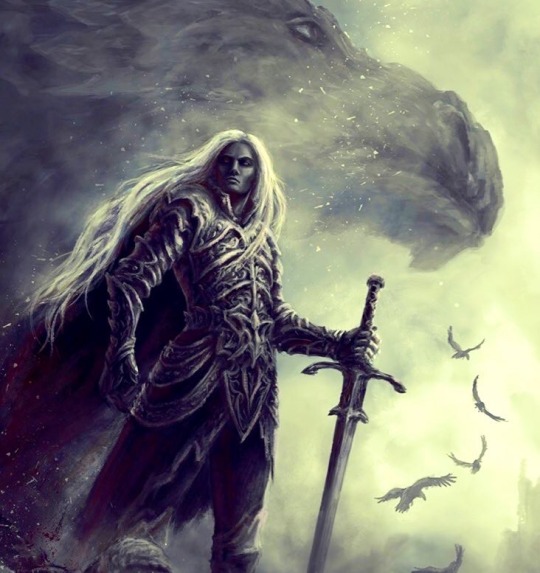
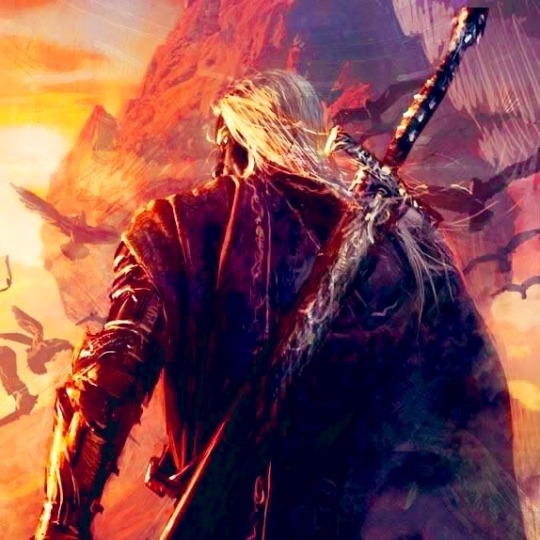

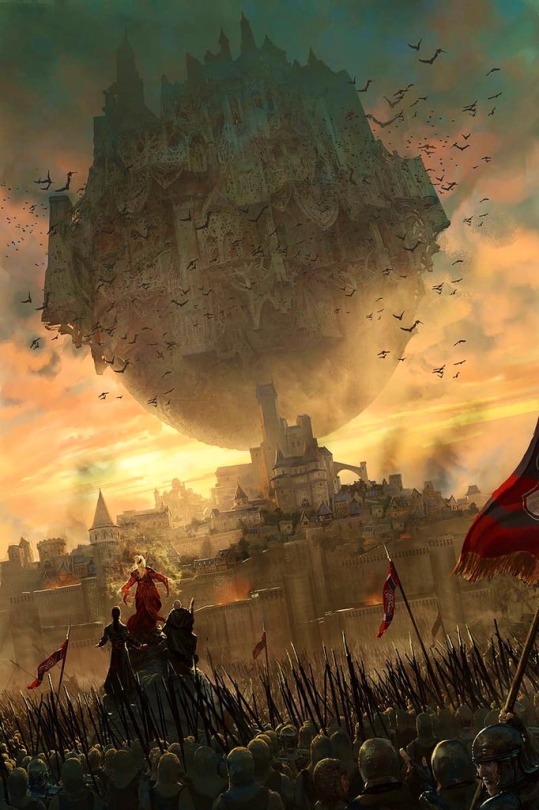


Currently Reading: The Crippled God, Book 10 of the Malazan Book of the Fallen.
This series is truly a masterpiece in the realm of epic fantasy— vastly varied casts of characters, strikingly unique inhuman races monsters alike, a thoroughly realized system of magic, and over 130 unique POV’s.
Ten Books is a lot to commit to, but I can confidently say there is NOTHING like Malazan.
36 notes
·
View notes
Text
xan and anna : smile
Though her eyes widen at the peculiar expression on the enchanter's face, her lips curl into a soft smile. She recognized his feeble attempt in impressing her with his beam—lips shivering as he spread them apart; teeth gritting with forces. Yet, his eyes comically reflect the opposite; an untouched morose flood his sight.
"Are you feeling feverish, Xan?" She prod the elf gently, a light tease dancing on her words.
Gone was the crooked impression of happiness that painfully carve to his face; a gloom return once more, replacing the unsettling light, with sorrowful darkness; like a vase that shatters, Anna is impressed by the speedy shift of his emotion. An exasperated sigh slips from his throat.
"You said: "smile Xan!" and I tried." He crosses his arms, turning his head away in mortification. His fingers cling to the his robe tightly in shame.
"Oh, Xan," a colorful giggle burst from the bard, as she reach for the elf. She wrapped him around under her hold, arm tighten into a warm comfort, "your presence alone is enough for me." She place her head over his shoulder, before she continue, "It was just horrible jest on my part," she nuzzle into his neck, before she kiss his cheek, "I quite enjoy your melancholy. It's growing on me."
"Truly?"
"Truly."
#bg1#baldurs gate 1#bg2#baldurs gate 2#xan bg1#original work : my writing#ship : moonspawn#oc : anna#i'm so rusty at writing lately BUT I HAVE TO PUSH THROUGH FOR THESE TWO#depress elf save me#save me depress elf
1 note
·
View note
Text

Chaos Lord Junaya Moonspawned, the Herd-caller, follower of the Great Beast.
This comm' took me a while but really proud of the result =w=
310 notes
·
View notes
Note
Hey moonspawn,its me, @jacktheeldergod . In another account. I was sent to kill a motherfucker that was a threat to your safety but he was just a guy with an illusion necklace. Should i execute him or nah?
oh, uhhh
thanks i guess :3
idk, do what you gotta do :3
18 notes
·
View notes
Text
I'm sure every artist either has or will experience a time where they sit down, decide to do a sketch just for funsies (maybe with some music or a video going in the background) and then hours later you've got a full on art piece. That being said...
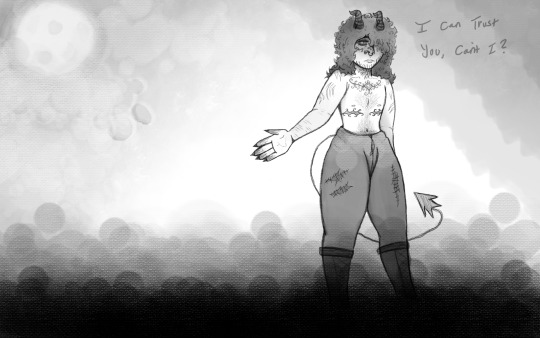
I'd decided to draw my BG3 Character/persona on my new drawing tablet. A hypothetical millenia passes, My posture is that of a shrimp and I look as if I haven't seen the sun in thousands of years. But hey! It turned out real good, didn't it?
Below, I will put more sketches and doodles done by your's truly!

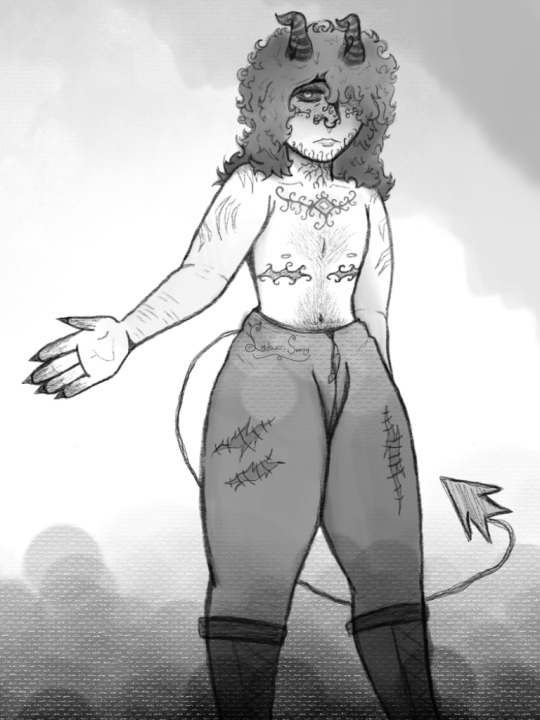

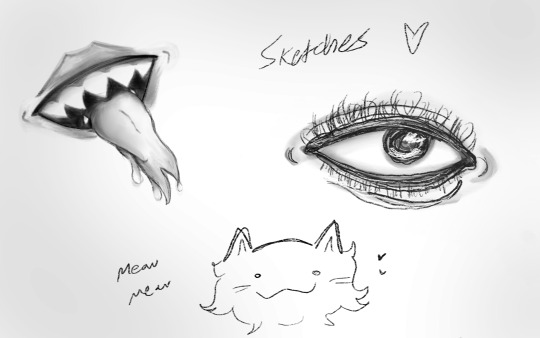
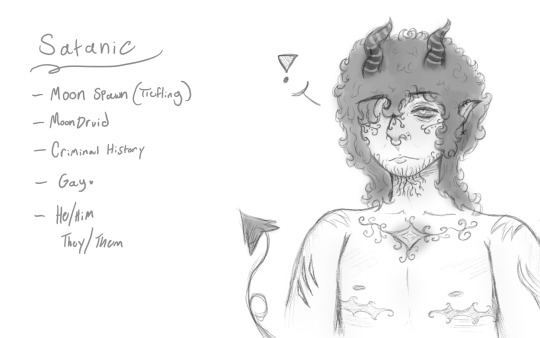
Bits of Info on my little guy :] What is a Moonspawn? Something I full on made up for my character out of my own braincells. Will I elaborate? No, not today sadly (I'm tired) but I'm sure you can get a nibble of info just on the title "moon-spawn" itself (don't patronize me I'm still working out pieces of his lore 😔)
Anyways! Lots of love! Have a wonderful day!💕💕💕
#original character#my persona#oc artwork#digital art#art#art work#digtal art#artwork#bg3 character#bg3 tav#bg3#baldur's gate 3#baldur's gate iii#baldurs gate tav#bg3 oc#bg3 original character#bg3 oc art
19 notes
·
View notes
Note
aaaaaaaand vex, 14? to finish off the blorbo thoughts

14. Detect Thoughts
"For the duration, you can read the thoughts of certain creatures. When you cast the spell and as your action on each turn until the spell ends, you can focus your mind on any one creature that you can see within 30 feet of you. If the creature you choose has an Intelligence of 3 or lower or doesn't speak any language, the creature is unaffected.
You initially learn the surface thoughts of the creature - what is most on its mind in that moment. As an action, you can either shift your attention to another creature's thoughts or attempt to probe deeper into the same creature's mind. If you probe deeper, the target must make a Wisdom saving throw. If it fails, you gain insight into its reasoning (if any), its emotional state, and something that looms large in its mind (such as something it worries over, loves, or hates). If it succeeds, the spell ends. Either way, the target knows that you are probing into its mind, and unless you shift your attention to another creature's thoughts, the creature can use its action on its turn to make an Intelligence check contested by your Intelligence check if it succeeds, the spell ends."
[No one asked for Ruidusborn!Percy but I am telling you: you want Ruidusborn!Percy.]
Catha squints, white and sightless, high in the sky. Sightless, he knows, because he can feel Ruidus behind the clouds. Closer, still, in the pulse deep in his belly.
It feels, as always, like judgment.
“You don’t trust me,” says Percival plainly. Picks up on the unsettled echo only because his walls are so shaky as-is, between these walls.
He endeavors to focus on his own mind before continuing: “I know. In fact, I agree. I shouldn’t be trusted.”
“The fact you know is half the problem,” Vax snaps. “What the fuck was that, back there? Burning out his tongue? The fucking crest? You didn’t need to torture the bastard, Freddy.”
Percy tips his head. “Torture is detrimental to extracting information in most contexts,” he agrees. “But it makes my skillset a little… easier.”
It felt a lot like prying apart his gun for repairs - a little leverage, a little twist here, to unveil the inner workings beneath his critical eye. Too much and the pain overwhelms conscious thought. He had to use a light touch. Learned, too well, what a light touch felt like.
(The worst part was how cold her mind had been, when he had no choice but to listen and listen and hear every other thought - his siblings’, his brothers’, his sister’s - go out, listen to the diagrams and debate on efficiency and see himself through her eyes as meat.)
There’s a temptation, as he faces Vax’s furious stare, to drop the pretense and listen. To know, truly, what they think of him. He was considered cursed, unlucky, moonspawn before. What is he, now, vomiting smoke and red lightning from his cruel hands? Worse than the unlucky birthday that made him what he is.
“Enough,” Vex says. “We don’t have time for this right now.” Her gaze flicks his way. “Percy - are you alright?”
“I’m fine,” he replies.
It isn’t just the moon that judges him - Vax’ildan, Vox Machina do, too.
--
The lesser vampire is dead. His goons are dead. Percival tastes ozone and smoke and the combination is disgusting and digs into the crevices between his teeth - he can’t spit it out.
He knows this manor. A few times he and his siblings visited family friends, here. Percival was usually permitted to excuse himself upstairs. Ostensibly to read. He did read - but he could feel the relief radiating off everyone when he left the room.
He’s gotten better, at keeping thoughts out of his head. First it was politeness, propriety - then something like a lifeline, that he was still himself, alone in his own head, a person, if unwhole.
(So why did he hear someone else, then?)
Such decency is a luxury Vox Machina cannot afford, here, in a Whitestone actively hunting for their heads.
So Percival feels Vex’ahlia storm up the steps after him. She does not bother to go quietly, to try and sneak up on him, so he supposes she must know this.
Vex is… an enigma. One he would rather not solve, ever, because he doubts she wants to be known. The discrepancy between how she presents herself and how she thinks, how she feels, is so jagged he fears it will bleed into his own head sometimes.
For how ordered and careful she is in the day to day, how she measures out coin like a miser, she’s… messy. A tangle - bramble thicket throughout the seasons, the best he can describe. Impossible to follow, with leaves, blooms and berries in turn. And always bearing claws.
He’s thankful for that - it keeps him from stumbling into them - into her - when his focus wanes.
She’s sharp here, too, an arrow whizzing right up the stairs. Percy hastens to steel himself, blot out her thoughts - so focused on this goal, he’s completely caught off guard when she wheels him back into the wall. The wallpaper has been neglected - it creases against his back, beneath his hands.
The last scrap he catches, before he tunes her out, is ‘Is he alright?’
“I’m fine,” he says, without meaning, and regrets it so painfully when her eyes widen. “I’m - I’m sorry.”
“Look me in the eye, Percy,” Vex’ahlia snaps, and he obeys. It’s easier, when he has a target. Shooting is almost soothing for him, even if lately it feels as though his lightning is more effective. Here he zeroes in on the bullseye of her pupil, darting back and forth as she judges him.
“I’m sorry,” he repeats.
Vex blinks, and he is robbed for only a moment. “Do you trust us?”
Percy sputters. Made difficult by her forearm on his throat and - oh. He swallows, mind hot static. “Of course -”
“I trust you,” she says, more quietly, more pressure than words. “Please, Percy. Honest - are you alright?”
“You shouldn’t,” he replies. “Trust me, that is. We have been over this.”
Vex’s jaw works.
Here is a secret, among the many Percival keeps close to his chest: he has never been good at reading people.
Would you, if you could slip into the minds of others? If you could find the truth of their words behind their marks, even when you did not want it? How often the mouth has disagreed with the mind - Percy has learned not to trust the theater that plays out on the face. Had tried to find the skill, again, as he finally found control of his abilities, but - well.
Without the contact of his curious mind, he has no idea what Vex is thinking, what she is feeling. He strives to keep it that way.
“I do.” Vex sighs, and Percy can’t tell if she regrets this or confesses it to him, quietly, so her brother will not here. “Actually - why not take a look, darling?”
He balks. “I - what?”
She has both arms braced against him, and strains on her tiptoes - otherwise, he knows, she would tap her temple with a finger. “Yep. You don’t believe me - so. Read my mind, Percy.”
“Are you sure,” he strains to say, “that’s alltogether safe?”
He’s not stupid, nor blind - he knows he has been a rolling thunderstorm, dark clouds billowing off him, ribbed with red lightning. Can feel it, still, under his gloves - sparks jumping from skin to leather to skin and curling around the cuticles of his fingers.
“No,” she admits with a huff. “But I am worried, Percy. We all are - and if you can’t trust us to have your back, can’t feel safe enough to be honest…” Vex trails off, biting her lip, and he can’t help but follow the movement. She catches his eyes as they return to hers, and he thinks there might be something a bit smug. “I trust you. And I’d like to make that clear, before we face more of your demons.”
“Your brother does not trust me.”
“And I’m Vex, not Vax,” she snips back. Smiles. “Besides - I have nothing to hide, darling.”
Percy can’t read people - hasn’t needed to - but he knows a blatant lie when he sees one.
[Send me a spell and I'll write a ficlet/snippet to go with it!]
#(shes lying bc she needs to hide her Huge Fucking Crush on this fucking nerd. thats it thats her lie)#LOOK I FUCKING LOVE THE IMPLICATIONS OF MINDREADING!! THIS AU IS SUCH A LITTLE DARLING OF MINE IT FUCKS UP PERCY SO GOOD#ruidusborn!Percy#Perc'ahlia starts beneath the cut - this got a bit long so i didnt wanna torment mobile users#critical role#perc'ahlia#percahlia#percival de rolo#vex'ahlia#cr fanfic#critical role fanfiction#campaign 1#spell ask game#my writing
26 notes
·
View notes
Text
SORRY I’VE BEEN INACTIVE college has been super busy BUT I’m working on a brand new setting!! A full ref of her is Pending but take a sneak peek at this pretty new girl

#OC:Duskblade#Moonspawn#she’s a WOLFGIRL feel free to inquire about her if you so desire ^_^#I’m not gonna put this in all the usual tags bc this is just a little post but feel free 2 rb if you want!!! ^w^
1 note
·
View note
Text
I made it through NaPoWriMo 2021!
I know I’m uploading this in May, but I did write it yesterday. Day 30 - Cell:
The edifice rises from chasmic horizons
and, doing so, engineers chess on four levels
which legions of lords could not overthrow;
paradigm shifts are maintained in the overflow
and so the president rises agape from her throne
and her glittering fingernails point to the moon
and the hovering moonspawn cry shrill in atonement
and clinking gold whispers,
“It's over too soon,"
and despicably
Earth is a cosmic spittoon.
2 notes
·
View notes
Text
0 notes
Text


via Tumblr http://bit.ly/31oHXZa
via Blogger http://bit.ly/2WzIsky
via Tumblr http://bit.ly/2I6n9Ov
via Blogger http://bit.ly/2EZXDss
writersnoonereads: No one reads Liliane Giraudon. [The...
No one reads Liliane Giraudon.
[The following review of Giraudon’s Fur is by Gilbert Alter-Gilbert. It was first published in Bakunin vol 6 (1997) as part of Alter-Gilbert’s feature on the “cruel tale.”]
The first thing that strikes the reader of the fiction of Liliane Giraudon is that she doesn’t write like anyone else. Bearing vague traces of surrealism, Giraudon’s oeuvre draws comparison with that of Leonora Carrington, Gisèle Prassinos, and Rikki Ducornet; but Giraudon is not a surrealist. Neither is she a pure fantast like her French contemporary Julia Verlanger, nor a naive meliorist in spite of all odds like her other compatriot Marie Redonnet [ed.: Alter-Gilbert translated Redonnet’s Dead Man & Company]. Her voice is hypnotic, inscrutable, unique. A trip through one of her narratives is like a somnambular stroll through a rain-soaked ravine with an unreadable road map; a ramble in fugue-state through a wilderness where signposts are written in the language of emotion and the logic of the heart.
Giraudon is a practitioner of silent writing—that is, writing which does not explicitly signal its meaning or purpose. Her poetically-charged prose percolates with unsaid bubblings and unstated gurglings which never surge to the surface, but rush past in irresistible riptides. Her style is discontinuous, at times even fragmentary, yet image-rich and marked by descriptive precision. This disjunctive, highly-colored verbotechny results in an exquisite fuzziness a la Mallarmé. The pieces of her puzzles are like broken mirror shards, each reflecting other parts of a larger image, but never the whole. A clue may be taken from the title of her previous collection of stories (also published by Sun & Moon) Palaksch, Palaksch: a phrase employed by deranged poet Friedrich Holderlin, to mean anything…or nothing.
Giraudon’s operational field is a mythic space unpolluted by references to contemporary cheese culture; her characters breathe the sterile air of psycho-emotional vacuum. Her plots and themes are enigmatic and border on the unreal, if not, at times, the non-representational; but there are badges of familiar sensibility—a preoccupation with victims and victimization, revenge motifs, and acts of unrepentant enmity—conspicuous hallmarks of the cruel tale. Her inventory is stocked with fetish and fixation, aberrant behavior, medical anomaly, atavism, evolutionary warpage, and creatic compulsion. Her characters are wounded souls, lost, lonely, often self-loathing; insular anti-heroes whose private hells slowly unravel to reveal a barely controlled hysteria. Their secret selves, propelled by instinct and animal drives, are awash with dark undercurrents of primal savagery; held in bondage by a sensuality which starts out where D. H. Lawrence left off, they grope in a stew of dream and desire, around which the deformed, the disfigured, and the denatured do a dance for domination. These prisoners of the flesh, beset by strange obsessions, teased by Aeons and Archons, tortured by twisted eroticism, are gripped by predatory forces to which they are tacitly resigned. The spirit of Dr. Moreau is everywhere: hints at moonspawn and mutant progeny abound; insinuations of union between man and beasts accentuate an exploration of biomorphic boundaries and what defines them.
At least two of Fur’s narratives sit squarely in the grand tradition of the cruel tale: “Clothilde’s Goat” and “The Yellow Glove.” Others are about life’s cruelties: its tantalizations and temptations, dashed hopes, and damaged dreams; about dead babies whose absence is commemorated by concluding lines like: “At this time, around her, that is, here, near us, the stars continue their monotonous course; a terrible heart disease is found in all dogs.”
In “Lateral Life,” the subject is bodily sacrifice; in “The Lesson,” interruption, truncation, curtailment of action, inhibition of completion; in “The Peephole,” it is a masochistic ravishment persecution fantasy, with minatory spectral participants; in “The Tie,” the thinness of the veneer separating civilization from the teeming bestiality beneath. In “The Center,” linguistic interpreters inhabit a tactile sensorium which is a metaphor for the elusiveness of the abstract, the unobtainable nature of the absolute, and the ephemerality of all things; “Pauline Buisson” is about the art of suffering, how fate exacts its pound of flesh, how people get under the skin and make each other bleed; in “Wolf Pass” the keynote is the threat of the inhuman; in “Lidia’s Leg,” cross-species loss and longing.
From the country which gave birth to the cruel tale, to the Theater of Cruelty and to Donatien Alphonse de Sade, comes a fresh contribution to the canon of the unkind: Fur is a book of disturbing beauty reverberant with endless mystery.
[Gilbert Alter-Gilbert is a critic, translator, and literary historian whose recent publications include the grim anthology Life and Limb and an English-language edition of Vicente Huidobro’s Manifestos Manifest. An “experimental classicist,” Alter-Gilbert is an inveterate practitioner of fictive history (see Poets Ranked By Beard Weight), a genre pioneered by such illustrious forebears as Marcel Schwob and Raymond Roussel.]
Ed: also see a post on Giraudon on the Project for Innovative Poetry blog.
@WritersNoOneRds / Facebook
0 notes
Photo


I thought of this weird elf AU for the sides.(Original characters by @thatsthat24 btw) There are 5 species of elves: Leafgrales, Flameshears, Droplets, Starspawns, and Moonspawns. Anxiety is a Moonspawn and Logic is a Leafgrale. My camera quality sucks, but I hope at least one person likes it. Currently, I'm working on Morality, who is a Droplet. Princey is a Flameshear. Thomas is a Starspawn.
1 note
·
View note
Note
For the ask game: I'm excessively sleepy don't know a lot and am kinda slow to pick up on things, like 70% of my time and brainspace is dedicate to video games because im far too much of a nerd- In case you haven't noticed, I'm weird. I'm a weirdo. I don't fit it, and I don't... wanna fit in. Have you ever seen me without this stupid beanie on? absolutely not. OH and not a personality trait but my boobs are huge (in spirit) also something something spooky flesh meat rawr ext ext
YOUR OC FRIEND ASSIGNMENT: Ecstasy Angel!

She would love just vibing with you, and appreciate you as a contrast to her high-energy lifestyle, but she's not exactly a great influence. She doesn't know anything about video games, but she'd be happy to listen to you talk about them; despite her egotistical persona, she really does care about her friends and what they love. And she would love your boobs <3
YOUR OC ENEMY ASSIGNMENT: Duskblade Shadowstorm!

Constantly pushing herself to the limit and believing that anything less is laziness that deserves to be punished, she wouldn't mesh well with your easygoing personality and interest in leisure activities. She'd end up arguing with you a lot.
Describe yourself, and I’ll assign one OC to be your friend and one to be your enemy!
1 note
·
View note
Text

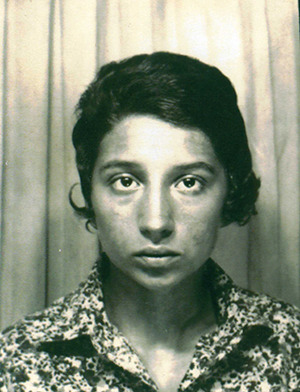
via Tumblr http://bit.ly/31oHXZa
via Blogger http://bit.ly/2WzIsky
writersnoonereads: No one reads Liliane Giraudon. [The...
No one reads Liliane Giraudon.
[The following review of Giraudon’s Fur is by Gilbert Alter-Gilbert. It was first published in Bakunin vol 6 (1997) as part of Alter-Gilbert’s feature on the “cruel tale.”]
The first thing that strikes the reader of the fiction of Liliane Giraudon is that she doesn’t write like anyone else. Bearing vague traces of surrealism, Giraudon’s oeuvre draws comparison with that of Leonora Carrington, Gisèle Prassinos, and Rikki Ducornet; but Giraudon is not a surrealist. Neither is she a pure fantast like her French contemporary Julia Verlanger, nor a naive meliorist in spite of all odds like her other compatriot Marie Redonnet [ed.: Alter-Gilbert translated Redonnet’s Dead Man & Company]. Her voice is hypnotic, inscrutable, unique. A trip through one of her narratives is like a somnambular stroll through a rain-soaked ravine with an unreadable road map; a ramble in fugue-state through a wilderness where signposts are written in the language of emotion and the logic of the heart.
Giraudon is a practitioner of silent writing—that is, writing which does not explicitly signal its meaning or purpose. Her poetically-charged prose percolates with unsaid bubblings and unstated gurglings which never surge to the surface, but rush past in irresistible riptides. Her style is discontinuous, at times even fragmentary, yet image-rich and marked by descriptive precision. This disjunctive, highly-colored verbotechny results in an exquisite fuzziness a la Mallarmé. The pieces of her puzzles are like broken mirror shards, each reflecting other parts of a larger image, but never the whole. A clue may be taken from the title of her previous collection of stories (also published by Sun & Moon) Palaksch, Palaksch: a phrase employed by deranged poet Friedrich Holderlin, to mean anything…or nothing.
Giraudon’s operational field is a mythic space unpolluted by references to contemporary cheese culture; her characters breathe the sterile air of psycho-emotional vacuum. Her plots and themes are enigmatic and border on the unreal, if not, at times, the non-representational; but there are badges of familiar sensibility—a preoccupation with victims and victimization, revenge motifs, and acts of unrepentant enmity—conspicuous hallmarks of the cruel tale. Her inventory is stocked with fetish and fixation, aberrant behavior, medical anomaly, atavism, evolutionary warpage, and creatic compulsion. Her characters are wounded souls, lost, lonely, often self-loathing; insular anti-heroes whose private hells slowly unravel to reveal a barely controlled hysteria. Their secret selves, propelled by instinct and animal drives, are awash with dark undercurrents of primal savagery; held in bondage by a sensuality which starts out where D. H. Lawrence left off, they grope in a stew of dream and desire, around which the deformed, the disfigured, and the denatured do a dance for domination. These prisoners of the flesh, beset by strange obsessions, teased by Aeons and Archons, tortured by twisted eroticism, are gripped by predatory forces to which they are tacitly resigned. The spirit of Dr. Moreau is everywhere: hints at moonspawn and mutant progeny abound; insinuations of union between man and beasts accentuate an exploration of biomorphic boundaries and what defines them.
At least two of Fur’s narratives sit squarely in the grand tradition of the cruel tale: “Clothilde’s Goat” and “The Yellow Glove.” Others are about life’s cruelties: its tantalizations and temptations, dashed hopes, and damaged dreams; about dead babies whose absence is commemorated by concluding lines like: “At this time, around her, that is, here, near us, the stars continue their monotonous course; a terrible heart disease is found in all dogs.”
In “Lateral Life,” the subject is bodily sacrifice; in “The Lesson,” interruption, truncation, curtailment of action, inhibition of completion; in “The Peephole,” it is a masochistic ravishment persecution fantasy, with minatory spectral participants; in “The Tie,” the thinness of the veneer separating civilization from the teeming bestiality beneath. In “The Center,” linguistic interpreters inhabit a tactile sensorium which is a metaphor for the elusiveness of the abstract, the unobtainable nature of the absolute, and the ephemerality of all things; “Pauline Buisson” is about the art of suffering, how fate exacts its pound of flesh, how people get under the skin and make each other bleed; in “Wolf Pass” the keynote is the threat of the inhuman; in “Lidia’s Leg,” cross-species loss and longing.
From the country which gave birth to the cruel tale, to the Theater of Cruelty and to Donatien Alphonse de Sade, comes a fresh contribution to the canon of the unkind: Fur is a book of disturbing beauty reverberant with endless mystery.
[Gilbert Alter-Gilbert is a critic, translator, and literary historian whose recent publications include the grim anthology Life and Limb and an English-language edition of Vicente Huidobro’s Manifestos Manifest. An “experimental classicist,” Alter-Gilbert is an inveterate practitioner of fictive history (see Poets Ranked By Beard Weight), a genre pioneered by such illustrious forebears as Marcel Schwob and Raymond Roussel.]
Ed: also see a post on Giraudon on the Project for Innovative Poetry blog.
@WritersNoOneRds / Facebook
0 notes